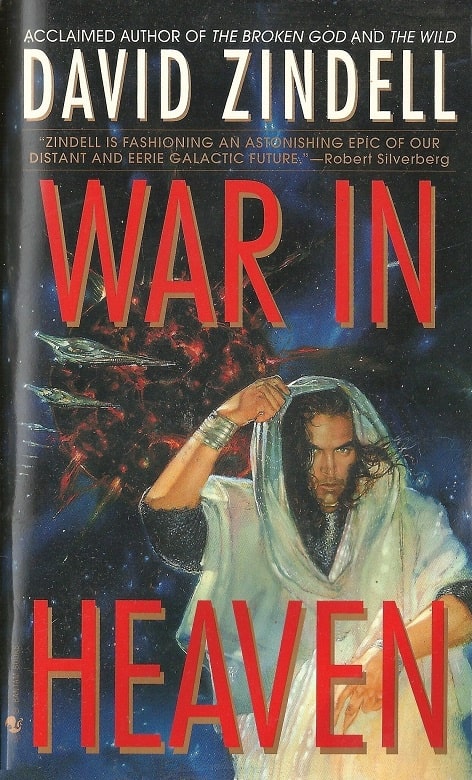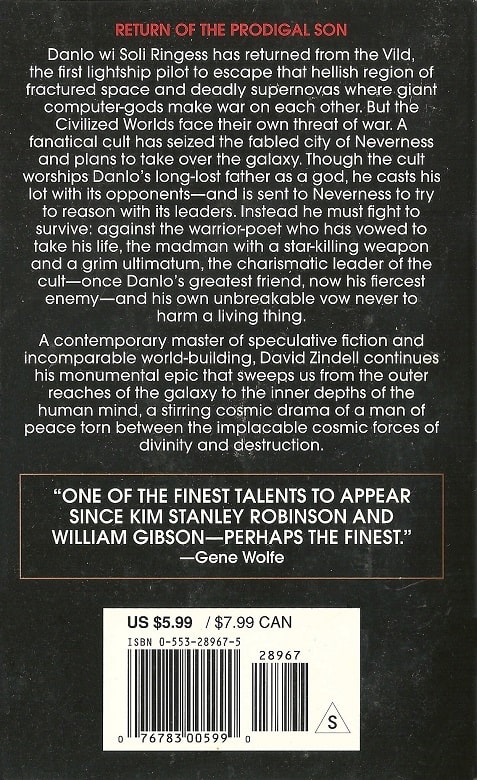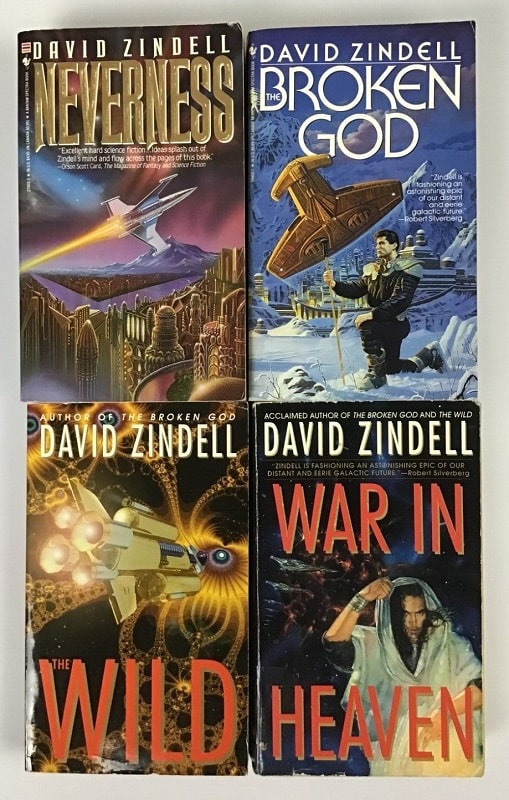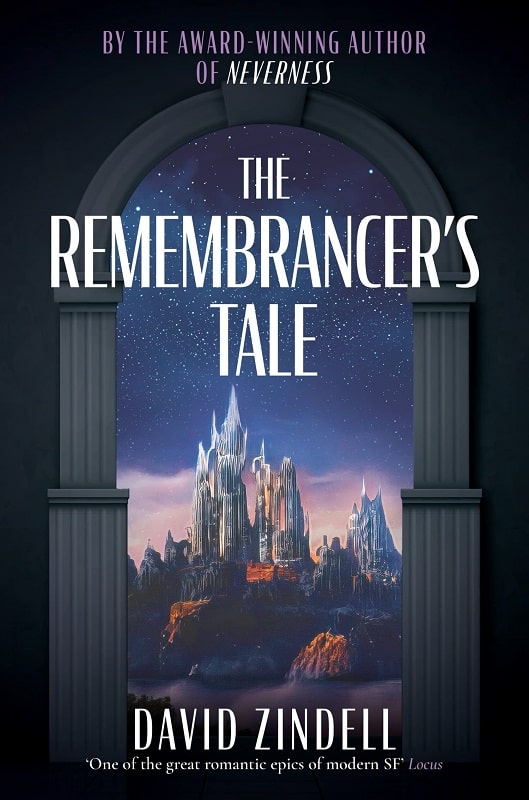Vintage Treasures: War in Heaven by David Zindell
 |
 |
War in Heaven (Bantam Spectra, January 1998). Cover by Dean Williams
David Zindell came out of the gate strong as a young science fiction writer in the 80s and 90s. He was nominated for the John W. Campbell Award for Best New Writer in 1986, and his debut novel Neverness won instant and wide acclaim. Edward Bryant said it “Propels him instantly into the big leagues with the likes of Frank Herbert and Ursula K. Le Guin,” and Kirkus Reviews gushed “Zindell succeeds brilliantly… in his convincing portrayal of what a super-intelligent being might be like…. Vastly promising work.” On the basis of that single novel, Gene Wolfe called Zindell “One of the finest talents to appear since Kim Stanley Robinson and William Gibson — perhaps the finest.”
Zindell followed up Neverness with a sequence set in the same universe, A Requiem for Homo Sapiens. War in Heaven (1998) was the last book in the series — and in fact the last science fiction book he ever wrote. At least until he returned to the genre this year, with his first new SF novel in a quarter century, The Remembrancer’s Tale.
[Heavens! Don’t forget to click the images for bigger versions.]
Neverness and the Requiem for Homo Sapiens trilogy by David Zindell
(Bantam Spectra). Covers by Don Dixon, Stephen Youll, John Dismukes, and Dean Williams
There are plenty of reviews of Zindell’s science fiction out there. My favorite overview of the whole series is at the OpusZine website; here’s a taste.
Zindell’s sci-fi novels… are set tens of thousands of years in the future, long after humanity has spread throughout the galaxy to occupy countless worlds. While various alien races exist, like the Fravashi, Scutari, and the Friends of Man, humanity is the galaxy’s dominant species, and the pinnacle of humanity is found in the Order of Mystic Mathematicians and Other Seekers of the Ineffable Flame.
A quasi-monastic society based in the exotic city of Neverness on the planet Icefall, the Order consists of over a hundred distinct disciplines with fanciful names like akashics, cantors, cetics, horologes, eschatologists, remembrancers, and scryers — each of which is dedicated to a particular area of study… At the Order’s pinnacle are the pilots, who traverse the galaxy in an endless quest for knowledge. In order to cover such vast distances, pilots send their ships hurtling through the manifold, a hyperspace-like dimension where they employ complex and abstract mathematics to jump between the stars…
But even the Order, with all of its knowledge, pales in comparison to the various godlike entities who rule vast parts of the galaxy. Some of them are AI constructs who flourished after escaping their human minders while others were humans who used to advanced technology to transcend the flesh and become divine. (I didn’t realize it at the time, but Neverness was my first exposure to the concepts of transhumanism.) With names like the Solid State Entity, the Silicon God, Ede the God, Iamme, and the April Colonial Intelligence, these massive entities — think V’ger from Star Trek: The Motion Picture — are not to be trifled with as they war amongst themselves for survival and preeminence, leaving entire solar systems in ruins.
These godlike “Jupiter brains” aren’t the only existential threat facing humanity, however. The galaxy’s stars are inexplicably exploding, creating a barren and deadly region of space called the Vild that’s spreading at an alarming rate. Unless the Vild’s growth can be stopped, and the stars kept from going supernova, countless worlds will be destroyed, including Icefall. And with it, the Order.
Against this epic, galaxy-spanning backdrop unfolds the story of two men, a father and son named Mallory and Danlo Ringess. Neverness is essentially Mallory’s autobiography in which he recounts his adventures as a headstrong pilot determined to make a name for himself in the Order. This ambition leads him on a foolish quest to confront the Solid State Entity and find the Elder Eddas, a legendary message left behind by the Ieldra, the alien race that seeded all other life in the galaxy…
Neverness’ sequels — also narrated by the now-divine Mallory — follow his son Danlo, who was born and raised amongst the Alaloi. After his adoptive tribe is decimated by a mysterious plague, Danlo resolves to find a cure by making the perilous journey across Icefall to Neverness, joining the Order, and becoming a pilot like his father… [and] discover his father’s final fate…
I don’t think it would be a David Zindell novel if there weren’t an epiphany or two per chapter. Any and all flaws aside, I’m not sure I’d want it any other way, because I’ve yet to read anything that has intrigued and captivated me, for better or worse, quite like David Zindell’s epic, philosophical sci-fi.
Zindell has one of the better author websites out there, and he offers a lot to explore for fans of his books. Here’s an extract from his article on the genesis of War in Heaven.
War has always fascinated me for two main reasons: first, because it is so horrible and insane it seems impossible that human beings should be able to wage war at all. And second, because it brings out both the absolute best and the absolute worst in us. It also reveals something very deep about the nature of reality. The more levels of strife a war novel depicts, the more it reveals…
Danlo… soon finds himself at the very center of this war to determine the fate of the universe. He returns to Neverness at a terrible time: in only a few more years, the destroying light from the exploding stars will fall upon the city and its planet, killing all life. Already, killing has come to Neverness. A bomb annihilates the hydroponic food factories; people fire lasers at each other and fight in the streets. The whole city, locked in the ice of winter, cut off from stars by fleets of battling warships, begins to starve.
I once read an account of the hard times that befell Stalingrad during its siege by the German army. No bloodier battle have human beings so far fought, for two million men, women and children died in its bomb-blasted buildings and frozen streets. Many starved there, too. Some turned to cannibalism, scavenging the bodies of the dead. The worst of these man-eaters lured people to dark apartments with the promise of food to be had, with no questions asked. They murdered the clandestine shoppers, who wound up being butchered and packaged as food themselves to be sold to others.
How this horrified me! Similar conditions, thirty thousand years in the future, horrify Danlo nearly to the point of madness. How can he keep his vow of ahimsa in the middle of such mayhem? Is it really possible, he wonders, to be completely non-violent? Can even the best of men and women be completely good – or even try to be? What does it mean to be a complete human being who says yes to all things?
Some gods, such as the Silicon God… embody the worst traits of billionaires and world conquerors, gobbling up everything material around them. In their narcissism gone wild, they actually dream of absorbing the universe into themselves and becoming as God.
This desire drives the war among the gods. The intense evolutionary pressure to survive compels them to grow as big as moons and whole solar systems, and to slay each other. The Silicon God has become better at this slaying than any other. In a battle lasting only seconds, in its first phase, he has effectively destroyed Ede the God: all that remains of him is a small devotionary computer not much more powerful than one of today’s laptops. It is almost like a toy, projecting a hologram of a little man.
After the publication of War in Heaven, Zindell switched to fantasy, writing a long series known as the EA Cycle, beginning with The Lightstone (2001), The Ninth Kingdom (2002, unpublished in the US), and The Silver Sword (2002). He didn’t return to the world of Neverness until The Remembrancer’s Tale, published in February of this year.
The Remembrancer’s Tale (HarperVoyager UK, February 2023)
Neverness was published in hardcover by Donald I. Fine in 1988; the first four novels were published in paperback in the US by Bantam Spectra, and have been out of print from the publisher for 25 years. Zindell has self-published most of the books in the US, and most are currently available through Amazon and other fine sites.
Neverness (552 pages, $4.95 in paperback, July 1989) — cover by Don Dixon
The Broken God (695 pages, $5.99 in paperback, January 1994) — cover by Stephen Youll
The Wild (552 pages, $5.99 in paperback, August 1996) — cover by John Dismukes
War in Heaven (645 pages, $5.99 in paperback, January 1998) — cover by Dean Williams
The Remembrancer’s Tale (HarperVoyager, 560 pages, £5.99 in digital formats, February 2023) — cover artist unknown
See all our recent Vintage Treasures here.


“with his first new SF novel in a quarter century, The Remembrancer’s Tale.”
Is The Idiot Gods a fantasy?
Hi Robert,
Excellent question.
I can’t find any evidence that The Idiot Gods ever had a US publisher. I did find a Kindle edition of something called The Orca’s Song on Amazon, which has the same cover as the UK edition of The Idiot Gods (again, with no publisher listed), but I can’t even find a reference to it on Zindell’s website. I’ve never seen a copy of it, and I have no idea if it’s science fiction.
So, yeah. The Remembrancer’s Tale is Zindell’s first new SF novel in a quarter century that I can confirm is broadly available to my North American readers — but I’d be delighted to amend that statement if I can find evidence to the contrary.